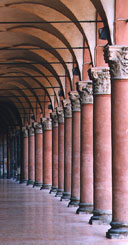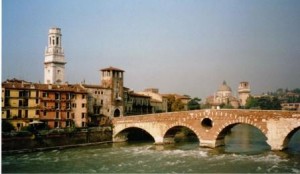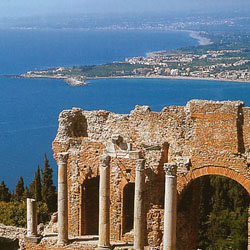Italian has long been referred to as the language of love, and many great Italian authors, such as Dante and Petrarca, have taken inspiration from this enchanting land whilst writing their great poems and novels. The learning of this romantic language is therefore an enticing proposition and has encouraged many people across the world to partake in a lesson or two before their annual holiday or a trip to their local ‘ristorante’. However, the easiest and most effective way to learn any language is to study in the native country, and nowhere is this more true than in the country of the ‘language of amore’ itself: Italy.
The Italian language is more than just the spoken word – it is an intrinsic part of the culture. Italian people enjoy talking their language. It has such an eloquent, expressive style and its poetic, evocative sound has given Italians a global reputation of being passionate and fiery individuals. This means that to truly understand the essence of this language, it is essential to live the Italian life, to indulge in the Italian emotions and to admire the great beauty that makes up this ‘bellissima’ peninsula.
There are many Italian language schools across the country, but I would like to focus on those that hold a special place in my heart. These are places that have each added an essential element to my current understanding of the language – not only through the words and grammar that I have learned along the way but through the experiences that each place has offered me.
Bologna
 I began my study of the Italian language at Cultura Italiana – a school which is located in a wonderful medieval building in the historical centre of Bologna. This is a city where you can truly become a part of the Italian culture and community without being surrounded by the clichés of mass tourism. Bologna has hidden surprises around every corner – in fact one of my favourite memories is of sitting in the beautiful, moonlit courtyard of a wine bar, which was housed in an Etruscan-style building on a narrow ‘via’. This was such an enjoyable evening, but I never managed to find the building again – it had seemingly disappeared into the medieval labyrinth of the winding streets and porticos. I could spend hours sitting on the steps of the Basilica di San Petronio in Piazza Maggiore, reading the school’s textbooks and watching the busy Italian world go by. Giardini Margherita is another favourite of the city’s residents and many a summer’s evening can be spent sitting in the large park listening to the impromptu guitar solos fill the air.
I began my study of the Italian language at Cultura Italiana – a school which is located in a wonderful medieval building in the historical centre of Bologna. This is a city where you can truly become a part of the Italian culture and community without being surrounded by the clichés of mass tourism. Bologna has hidden surprises around every corner – in fact one of my favourite memories is of sitting in the beautiful, moonlit courtyard of a wine bar, which was housed in an Etruscan-style building on a narrow ‘via’. This was such an enjoyable evening, but I never managed to find the building again – it had seemingly disappeared into the medieval labyrinth of the winding streets and porticos. I could spend hours sitting on the steps of the Basilica di San Petronio in Piazza Maggiore, reading the school’s textbooks and watching the busy Italian world go by. Giardini Margherita is another favourite of the city’s residents and many a summer’s evening can be spent sitting in the large park listening to the impromptu guitar solos fill the air.
If Bologna is ideal for those looking to completely absorb themselves in daily Italian life, then Taormina is perfect for students who prefer some sea and sun with their studies. The Babilonia Italian Language School is situated in the breathtakingly beautiful clifftop town of Taormina on the island of Sicily. I have spent many years living on this island and, in my opinion, Taormina is the most charming town in the whole of Italy; I could easily spend weeks exploring its many tiny streets and hidden piazzas. The main meeting area for the town is Piazza IX Aprile where mandolin players provide the perfect accompaniment to the stunning view of the Taormina coastline below and the Mount Etna volcano high above. The entire coastline of the province of Messina is dotted with sandy beaches and rocky coves, and evenings can be spent at one of the many rustic trattorias. Alternatively, I can also thoroughly recommend dancing at one of the palm tree adorned, open air nightclubs along the coast and then watching the sun rise over the bay of Giardini Naxos. No other destination could possibly provide more motivation to learn than the town which inspired works such as Lady Chatterley’s Lover, which was written during D.H. Lawrence’s residence in Taormina.
Verona
 If you are inspired to learn Italian because of its romantic reputation then surely the ideal location to learn it is the home of perhaps the most famous lovers in history, Romeo and Juliet. Shakespeare set the story of these ‘star-crossed lovers’ in the city of Verona and it is still possible to visit the ‘Casa di Giulietta’, or Juliet’s house, in the historic centre where the young heroine’s balcony still stands. The city is also famous for the renowned ‘Arena di Verona’ which is a Roman amphitheatre that now holds large-scale operatic productions such as Verdi’s ‘La Traviata’, and gives students the perfect chance to practice their new Italian skills. The atmosphere inside the arena is incredible, transporting you to an Italy of long ago; however, I could also sit for hours in a café in Piazza Bra, mesmerised by the wonderfully chic Italians parading by on their way to the opera. Like Bologna, Verona has excellent rail links and is therefore perfect for exploring other towns in Northern Italy. Lake Garda is only 25 kilometres away and offers the ideal setting for a leisurely afternoon away from your studies in the city. There are many Italian language schools in Verona – Lingua It is situated in the historic centre and specialises in teaching Italian to foreigners.
If you are inspired to learn Italian because of its romantic reputation then surely the ideal location to learn it is the home of perhaps the most famous lovers in history, Romeo and Juliet. Shakespeare set the story of these ‘star-crossed lovers’ in the city of Verona and it is still possible to visit the ‘Casa di Giulietta’, or Juliet’s house, in the historic centre where the young heroine’s balcony still stands. The city is also famous for the renowned ‘Arena di Verona’ which is a Roman amphitheatre that now holds large-scale operatic productions such as Verdi’s ‘La Traviata’, and gives students the perfect chance to practice their new Italian skills. The atmosphere inside the arena is incredible, transporting you to an Italy of long ago; however, I could also sit for hours in a café in Piazza Bra, mesmerised by the wonderfully chic Italians parading by on their way to the opera. Like Bologna, Verona has excellent rail links and is therefore perfect for exploring other towns in Northern Italy. Lake Garda is only 25 kilometres away and offers the ideal setting for a leisurely afternoon away from your studies in the city. There are many Italian language schools in Verona – Lingua It is situated in the historic centre and specialises in teaching Italian to foreigners.
All of the schools mentioned above can provide assistance with accommodation – whether you would like the privacy of your own apartment or prefer to be welcomed by a local host family.
So, why not follow my lead and create your own experience of the ‘dolce vita’!
Contact details for the schools are as follows –
Cultura Italiana, Bologna –
http://www.culturaitaliana.eu/Bologna.html. Tel: 0039 051228003
Babilonia, Taormina –
http://www.babilonia.it/. Tel: 0039 0942 23441
Lingua IT, Verona –
http://www.linguait.it/. Tel: 0039 045597975



